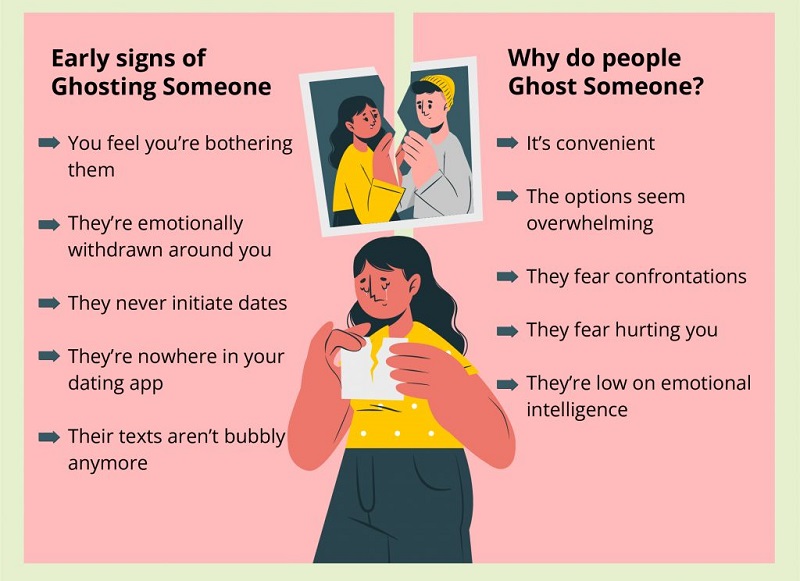Being ghosted by a long-term partner—when someone you’ve built a life with suddenly disappears without warning or explanation—is one of the most disorienting forms of heartbreak. Unlike a typical breakup where you get some closure, ghosting leaves you with unanswered questions, self-doubt, and a profound sense of rejection. You’re left staring at your phone, replaying every last conversation, trying to pinpoint the exact moment things went wrong. While the pain feels unbearable right now, it’s important to understand this isn’t your fault. If you need a comprehensive guide on the healing process, this article on how to get over being ghosted is a great starting point. Learning healthy coping strategies can help you heal, reclaim your sense of self, and move forward with confidence.
What Does It Mean to Be Ghosted in a Long-Term Relationship?
In the context of a long-term relationship, ghosting isn’t just ignoring a few texts. It’s a complete and sudden cutoff of all communication without any explanation. One day you’re planning your future, and the next, they’ve vanished. They stop answering calls, ignore messages, and might even block you on social media. It can happen instantly (hard ghosting) or be a gradual fade-out where communication becomes sparse and shallow before stopping completely (soft ghosting). Ghosting after years together is particularly devastating because of the deep emotional investment and intertwined lives.

How Ghosting in Serious Relationships Differs From Casual Dating
The sting of being ignored is always unpleasant, but the pain is on a completely different level when it happens in a serious relationship. Ghosting after a few casual dates is disappointing, but ghosting after a first date doesn’t carry the same weight. When you’ve invested months or years, you’ve built a life together. You share memories, mutual friends, routines, and future plans. The person who left wasn’t just a date; they were your partner, your confidant, your family. The betrayal cuts deeper because the trust that was broken was so foundational.
Common Signs You’re Being Ghosted
The signs can be subtle at first, then escalate into a deafening silence. You might be experiencing it if your partner:
- Stops responding to your calls, texts, and emails after multiple attempts.
- Blocks you on social media or messaging apps without a word.
- Cancels future plans and provides no reason or rescheduling options.
- Is active online but completely ignores your messages.
- Suddenly avoids mutual friends or shared spaces.
- Gradually withdraws emotionally, giving short, surface-level replies before disappearing entirely.
Why Do People Ghost in Long-Term Relationships?
Understanding the “why” doesn’t excuse the cruelty of ghosting, but it can help shift the focus away from self-blame and toward healing. Ghosting is almost always a reflection of the ghoster’s limitations, not a measure of your worth.
Avoidant Attachment and Fear of Intimacy
Some people have an avoidant attachment style, meaning deep emotional intimacy feels threatening. As a relationship gets more serious and vulnerable, they may feel overwhelmed and pull away. Ghosting becomes a self-preservation tactic to escape feelings they can’t handle. It’s a destructive way to deal with a fear of getting too close or being hurt.
Conflict Avoidance and Poor Communication Skills
Many ghosters are deeply conflict-avoidant. They lack the emotional maturity and communication skills to have a difficult breakup conversation. In their minds, they may rationalize that disappearing is “kinder” than causing a painful scene. In reality, this avoidance creates a much deeper, more confusing wound for the person left behind. It’s an immature way to sidestep accountability.
Emotional Overwhelm and Unresolved Personal Issues
Sometimes, the ghoster is dealing with a personal crisis, like a mental health struggle, family emergency, or financial trouble. They may become so overwhelmed that they shut down completely, cutting off everyone around them, including their partner. While this is an explanation, it is not an excuse for abandoning someone you love without a single word.
Toxicity, Loss of Attraction, or Meeting Someone New
In other cases, the reasons are more direct. The ghoster may have felt the relationship was toxic, lost feelings of attraction, or started a new relationship. They choose ghosting to avoid the discomfort of admitting their feelings changed or that they were unfaithful. It’s a way to escape without having to face the consequences of their actions.
The Emotional Impact of Being Ghosted
The psychological fallout from being ghosted is significant. Research has shown that it can lead to heightened anxiety, depression, and a drop in self-esteem. The brain craves resolution, and the lack of closure can feel like trying to solve a puzzle with a critical piece missing.

The Stages of Grief After Ghosting
The grieving process after being ghosted often moves through several stages, though they are rarely linear:
- Shock and Denial: You can’t believe they are truly gone. You check your phone constantly, expecting a message with an explanation.
- Confusion and Self-Blame: You replay every last interaction, analyzing your words and actions, trying to find what you did “wrong.”
- Anger and Betrayal: You feel furious at their cowardice and the profound disrespect they’ve shown you.
- Sadness and Grief: The reality sets in, and you mourn the loss of the person you loved and the future you planned together.
- Acceptance: You start to accept that their silence is the answer, and you begin the slow process of rebuilding.
Why the Lack of Closure Hurts So Much
Closure helps our brains process loss and move forward. Without it, we get stuck in a loop of “what if” questions. The ambiguity is emotionally exhausting. You’re left to write your own ending to the story, and the narratives we create for ourselves are often far harsher than the truth. This unresolved state makes it incredibly difficult to heal.
Long-Term Effects on Trust and Future Relationships
Being ghosted can leave deep emotional scars. It can create lasting trust issues, making you fearful of abandonment in future relationships. You might become hypervigilant, interpreting a delayed text message as a sign that you’re about to be left again. This experience can make it difficult to be vulnerable and open your heart to someone new.
How to Cope With Being Ghosted: Immediate Steps
When the pain is fresh, focus on emotional first aid. These initial steps are about stabilizing yourself and taking back control.

Accept That No Response Is a Response
This is the hardest but most important first step. Their silence isn’t a mystery to be solved; it is the answer. It says, “I do not have the respect or courage to end this with you directly.” Accepting this painful reality is the first move toward taking your power back.
Resist the Urge to Keep Reaching Out
Sending a final message seeking clarity is understandable. However, sending multiple texts, voicemails, or emails only prolongs your pain and reinforces their control over your emotional state. Bombarding them won’t bring them back or give you the answers you deserve. Let your one message be the last, and then let it go.
Stop Blaming Yourself and Overanalyzing
Your mind will want to find a reason, and it will often land on self-blame. You are not responsible for their poor behavior. Ghosting is a reflection of their character, their fears, and their inability to communicate. Resisting the urge to spiral into self-criticism is crucial for your healing.
Allow Yourself to Grieve
This is a real and significant loss. Give yourself permission to feel the full spectrum of emotions—sadness, anger, confusion. Cry. Journal. Talk to a friend. Don’t try to suppress your feelings or rush the grieving process. You are mourning a person and a future that was taken from you without explanation.
Building a Healing Strategy: Long-Term Recovery
Once the initial shock subsides, you can focus on sustainable practices for long-term healing and recovery.
Implement a No Contact Rule
This is non-negotiable for healing. Block their number. Remove them from social media. It’s not about being petty; it’s about creating the space you need to heal without the constant temptation to check on them. This helps break the emotional attachment. Many wonder why ghosters always come back, and going no-contact ensures that if they do, you are in a position of power to decide what’s best for you.
Lean on Your Support System
Don’t go through this alone. Reach out to trusted friends and family who can offer a listening ear and validate your feelings. Feeling heard and understood is incredibly healing. Spend time with people who remind you that you are loved and valued. Avoid isolating yourself, as that can deepen feelings of sadness.
Practice Radical Self-Care
Self-care isn’t just bubble baths and face masks; it’s about actively doing what is good for your well-being.
- Maintain routines: Stick to regular sleep, meal, and exercise schedules.
- Reconnect with hobbies: Engage in activities that bring you joy and a sense of accomplishment.
- Spend time in nature: Go for a walk, a hike, or simply sit in a park.
- Process your emotions: Journaling and meditation can help manage overwhelming thoughts.
Reframe the Experience as Their Limitation, Not Your Failure
Continuously remind yourself: “This was not a reflection of my worth. This was a reflection of their character.” A person who is capable of disappearing from a long-term relationship lacks the emotional tools for a healthy, mature partnership. In a way, they revealed a critical incompatibility, saving you from more heartbreak down the road.
Set Boundaries for Future Relationships
Use this painful experience as a lesson in what you will and will not accept. Learn to identify red flags early on and communicate your needs and boundaries clearly. Setting high standards for how you deserve to be treated is not demanding—it’s an act of self-respect.

How Long Does It Take to Heal From Being Ghosted?
There is no magic timeline for healing. It depends on the length of the relationship, your attachment style, and your support system. It could take months or even longer. Progress isn’t linear; you will have good days and bad days. Be patient and compassionate with yourself. Over time, the pain will lessen, and you will find that you are no longer defined by this experience. For a deeper look at what this journey entails, exploring articles on how to get over being ghosted is a valuable next step.
Moving Forward: Rebuilding Trust and Opening Your Heart Again
The thought of dating again can be terrifying. Trusting someone new after such a profound betrayal is a huge challenge. But it is possible to open your heart again.
Red Flags to Watch For in Future Partners
- Inconsistent communication: Hot-and-cold behavior or long delays in responding.
- Avoidance of vulnerability: They keep conversations on the surface level and shy away from emotional topics.
- Vague about their past: They are reluctant to talk about previous relationships.
- Refusal to make concrete plans: They keep things non-committal.
Building Healthier Communication Patterns
This experience, as painful as it is, can teach you the immense value of clear, honest communication. Moving forward, prioritize partners who can handle difficult conversations with respect and empathy. Model the communication you wish to receive by expressing your own needs and feelings openly.
Conclusion
Being ghosted in a long-term relationship is a deeply painful and confusing form of loss. It’s an act that speaks volumes about the other person’s character, not yours. As you navigate the path forward, focus on self-compassion, lean on your support system, and give yourself the time you need to grieve. Healing isn’t about erasing the memory but about integrating the experience into your story without letting it define your future. You are resilient, and you will get through this. For more resources on wellness and personal growth, feel free to explore more on our site, www.notonetype.org.


Có thể bạn quan tâm
How to Be a Better Wife: Practical Ways to Strengthen Your Marriage
Being a wife is a role that evolves. Some days it feels natural, and other...
Dec
Essential Advice for Building a Strong, Lasting Relationship
Building a relationship that lasts takes more than just love—it requires consistent effort, open communication,...
Dec
How to Deal with an Angry Partner: Effective Strategies for a Healthier Relationship
Dealing with a partner who frequently expresses anger can feel overwhelming. It’s emotionally draining. Whether...
Dec
How to Deal with Relationship Stress: 7 Proven Ways
Relationship stress affects nearly every couple at some point, causing tension, communication breakdowns, and emotional...
Dec
How to Rebuild Trust in a Relationship: A Step-by-Step Guide
Rebuilding trust after it’s been broken can feel like trying to glue a shattered vase...
Dec
How to Fix a Broken Marriage: 12 Proven Steps to Reconnect
Fixing a broken marriage is possible when both partners commit to the process, even when...
Dec